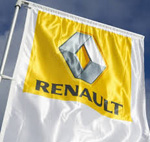 Wall Street Journal: French car maker Renault SA, one of the last large European companies still active in Iran, is considering winding down its sales to the country as the impact of international sanctions deepens, according to people familiar with the matter. The Wall Street Journal
Wall Street Journal: French car maker Renault SA, one of the last large European companies still active in Iran, is considering winding down its sales to the country as the impact of international sanctions deepens, according to people familiar with the matter. The Wall Street Journal
Automotive sanctions hitting sales
By BENOÎT FAUCON And DAVID PEARSON
 French car maker Renault SA, one of the last large European companies still active in Iran, is considering winding down its sales to the country as the impact of international sanctions deepens, according to people familiar with the matter.
French car maker Renault SA, one of the last large European companies still active in Iran, is considering winding down its sales to the country as the impact of international sanctions deepens, according to people familiar with the matter.
The pullback from the Iranian market could prove costly for Renault, due to lost sales revenue and asset write-offs, the people said.
The surprise election of moderate Hasan Rouhani as Iran’s president last month has rekindled hope in Tehran of a thaw in its relations with the West and of possible relief in mounting sanctions. But new U.S. sanctions targeting Iran’s automotive sector since July 1, combined with difficulties in getting paid by Iran as its economy sharply declines, has led Renault to cut its sales of automobile kits to Tehran’s manufacturers and review its strategy in the country.
A spokeswoman for Renault said the company’s commercial transactions in Iran “are slowing down, and we don’t have any visibility for the future.” Renault said recently it “is taking appropriate measures necessary to address the scope” of the new U.S. sanctions and their impact on its Iranian operations.
Renault has been active for years in Iran, where it sells kits of semi-assembled vehicles that are built up by its Iranian joint venture partner Iran Khodro. But international sanctions over Iran’s nuclear program have made doing business in the country much more challenging.
Sanctions have intensified in recent years and now include a European Union embargo on Iran oil and a U.S. ban on dealings with Tehran’s central bank. Even since the moderate Mr. Rouhani was elected president June 14, the administration of President Barack Obama has continued to tighten the screws on Iran. New rules that went into effect July 1 potentially ban from the U.S. any foreign bank that conducts transactions or accounts in Iran’s currency, the rial, as well as penalizing the sale of goods and services to Iran’s automotive industry.
Though European Union laws don’t forbid trade with Iran’s car makers, being targeted by Washington’s sanctions could complicate access to the U.S. financial system, according to one of the people familiar with the matter.
Without naming Renault, a spokesman for the U.S. Treasury said “companies around the world have taken notice of these new sanctions [on Iran’s automotive sector] and are rightly considering whether they want to continue business with Iran.”
Renault’s business has been long under pressure in Iran, though the market represents just a sliver of its global sales. The auto maker delivered 28,082 car kits to its Iranian partner in the first half of the year, down 48% from the same time a year earlier. Renault officials point out that the Iranian automobile market slumped 41% over the same period. Still, the French company’s market share has shrunk to 8.8% from nearly 12% in 2012.
“Due to economic factors in Iran, sales transactions are currently slowed down, in particular the supply of parts to our Iranian partners,” said the Renault spokeswoman. Although Iran’s share of Renault’s global sales has now fallen to just 2% from 4%, the impact of ceasing to do business there could be magnified because it could force the company to write down the value of kits that are either unpaid, or on which payments cannot be repatriated outside Iran, according to the people familiar with the matter.
Renault will release its first-half earnings Friday, where management could mention the company’s situation in Iran.
Last year, Renault’s French rival PSA Peugeot-Citroën SA took provisions and registered operating losses on its Iranian business after it decided to stop selling car kits to Iran, because it couldn’t obtain financing for shipments.


